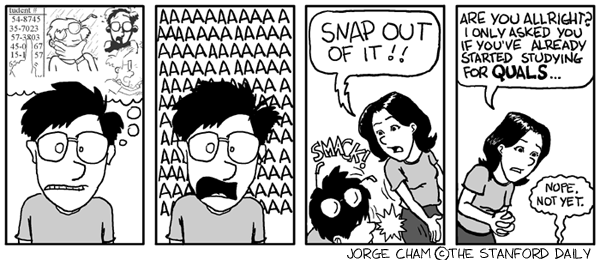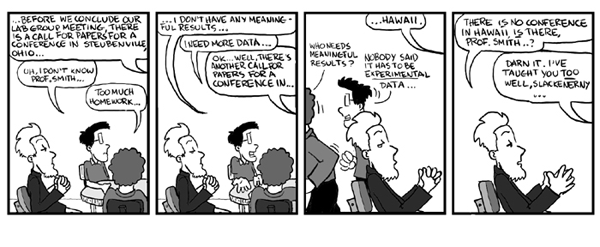
Another amazing comic by PhD Comics.
Life of a grad student involves getting excited over access to free catered food (because that’s a huge upgrade from free, yet slightly too cold pizza), hunching over computers or weird complicated looking instruments most hours of your day, and avoiding writing about what you’ve been hunched over and working hard for so long by means of procrastination (e. g., hours of video gaming for some, and mad crocheting of hats for others). These probably accurate descriptions of daily lives of most grad students are not necessarily the most glamorous part of grad school.
The glamour comes when you finally fight the demons of procrastination and communicate what exactly that weird instrument you’ve been working on is all about, or why the colourful graph on your computer is making you (and probably your advisor) so excited — and yes, labeling the axes of your graph really really helps in this process. If you don’t communicate what you’ve found, then the world won’t know anything about it, and that would be a tragic way to let your hopes and dreams of changing the world go down the drain.
Practically speaking, for those of us in our respective doctoral programs, publishing our research findings translates to career advancements. Journal publications typically have more weight when it comes to you playing that ‘when are you graduating?’ game. But when it comes to conference publications, that actually means fully funded (sometimes) international travel, and the privilege to present your work to the people who might actually want to know more about your work.
In the Department of Mechanical Engineering, there seems to be a hidden rule of thumb where if you’ve published more than a couple of journal papers, then your committee can’t really hold you back from adding the Dr. title in front of your name. So it may make sense to you that you should aim to publish journal papers, journals papers only, and pump them out fast.
But while that logic may work if your goal is to graduate quickly, it may not be the best of ideas if you are hoping to land a dream job after graduating, build a strong network of people you can collaborate with in the future, or make your research heard (literally & figuratively) to the people in your field. I mean, at the end of the day, advancing science, contributing new knowledge, helping to figure out how this world works.. these are the reasons why you’re hunched over your computer all the time, isn’t it? Well, maybe not for all of us, but you know. Conferences are where you find like-minded individuals who ‘get’ what you’re talking about, even when you haven’t even finished giving your elevator pitch. It’s also the place where friendship kind of emerges naturally, in a rather long-distance sort of way, because you get what they’re doing also — and that’s an amazing thing.
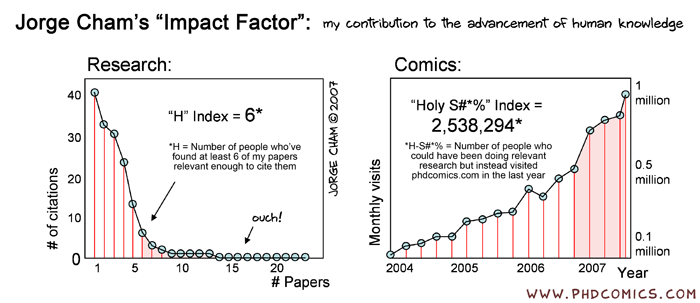
Another funny comic by PhD Comics. And yes, I think I know with a high level of certainty that more people read my blog posts than academic publications. Conveniently, Google Analytics tracks my Holy S#*% score.
Last week, I was in Germany attending the International Conference on Human-Robot Interaction 2014 (HRI’14). Even before I got to the conference venue, I ran into two of my “friends in research” from Switzerland and Japan at one of the tram stations. I had met them at two different occasions, one at a conference held in the Netherlands, and the other at a different conference in San Francisco (well, through twitter first, but whatever). Although I had met them separately at different times, they somehow knew each other and were sharing a hotel room. When I got to the conference, I met my old roommate from a couple of years ago when I was attending a summer school in Germany. Then another person from that other workshop, that other conference, etc. You get the point.
These are all people that I connect with and can have hours of great, interesting, sometimes research-related and sometimes personal conversations with. These are also people that I would hang out with on Skype from time to time, or send them Christmas cards to, because they are awesome and dear people to me.
Back in the days, I thought that was just that. I care about my research, and I would be happy to tell you all about it, but other people probably don’t want to bother getting to know the details of my work. I’m happy to get to know other people, learn from them, make some new friends, and enjoy the travelling portion of my work while I’m at it.
But I’m realizing that conferences can be important because your work can take on a life of its own. Your audience, those who care, may actually find your work interesting, and incorporate it into their future work. It sounds dumb now that I spell it out like this, since the whole aim of conferences are to exchange ideas and to learn from one another. But as a grad student, it’s hard to imagine that such phenomenon can apply to your work as well. This is especially true, when a lot of us go through the emotional ups and downs of research life and ask with doubt ‘does any of this matter?’ or ‘does anyone care?’
So, I had one of the most amazing moments of my research life when I found out that my paper I presented at a conference a handful of years ago had really made an impact. A PhD student came up to me at the conference last week, and said that he’s happy to finally meet me because his research is inspired by the work I had presented in the past. He had an abstract of his work written and everything, citing the work that I make fun of myself with all too often. I make fun of my work because I think it’s funny that years of my work is about this seemingly tiny little human phenomenon of hesitation and how implementing them into human-robot interaction context can be useful for getting robots to work with us better. Hesitations, seriously? But then, yes, yes, I know! Someone else is also talking about hesitations in HRI now. How exciting!
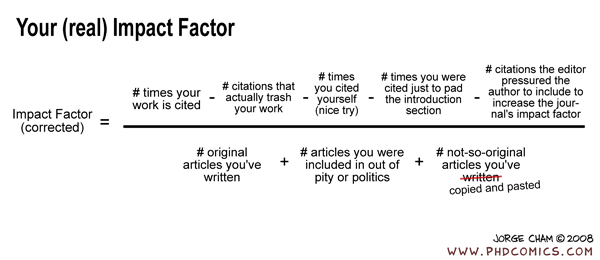
I probably sound like I’m bragging about my research. But that’s not my intention. The point here is that I had nothing to do with the impact my work had — I’ve been totally oblivious about this effect. I just published what I had worked on, and the paper kind of took on a life of its own. In a very passive and serendipitous manner, it brought some new or different ideas in someone else’s mind, and was already swirling into something different, perhaps bigger and more exciting.
This post became much longer than I intended, but I hope it inspires those of us trying to fight off that writer’s block or procrastination demon and motivates you to start typing out that paper.
Now, go. Type away madly. Beautify that amazing figure — and label those axes. At some prestigious conference somewhere awesome, you’ll be the expert to present the amazing results. Who knows what impact that will have?
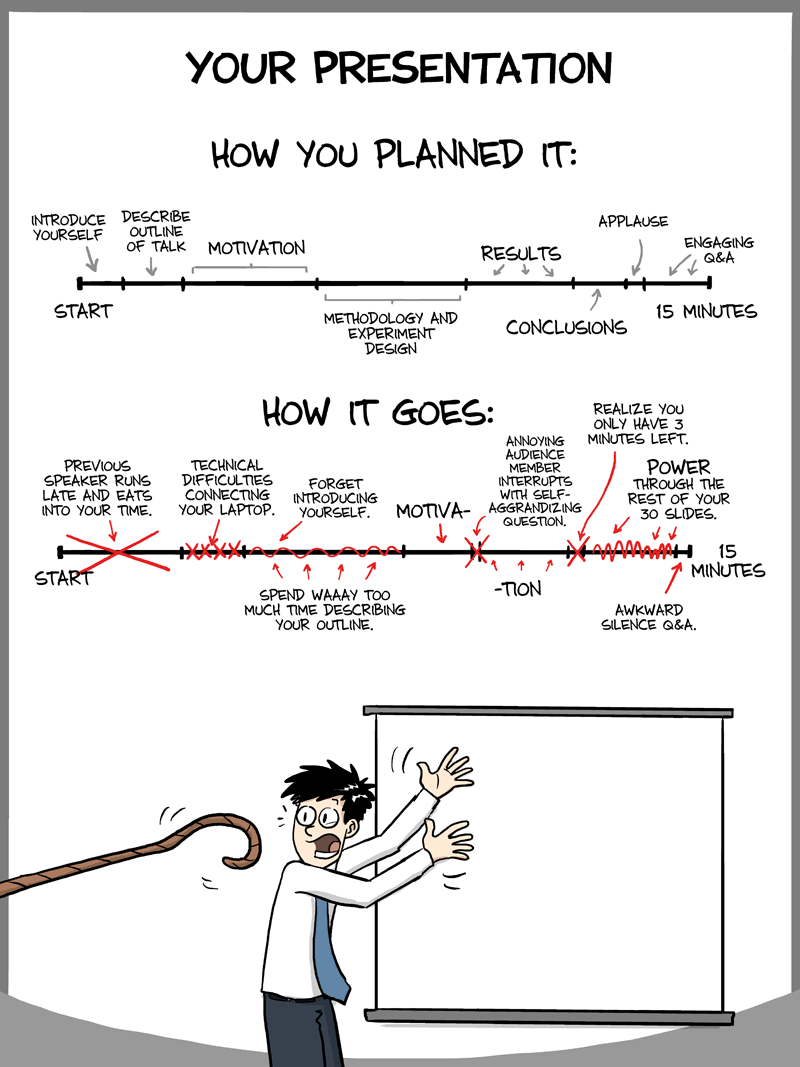
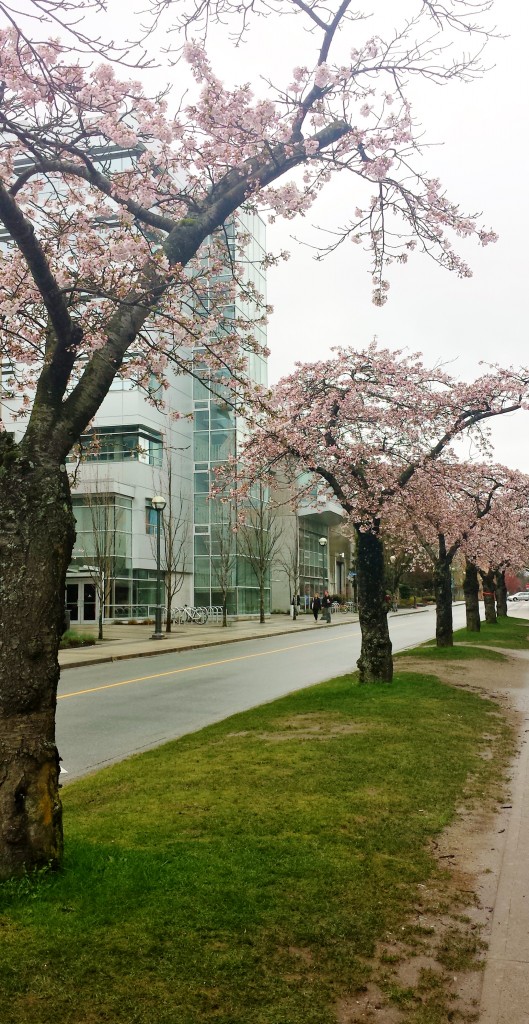

 Follow
Follow




 Dear super stressed out Mechanical Engineering PhD students preparing for the upcoming Monday’s comprehensive exam, a.k.a. the General Knowledge Exam (GKE),
Dear super stressed out Mechanical Engineering PhD students preparing for the upcoming Monday’s comprehensive exam, a.k.a. the General Knowledge Exam (GKE),
